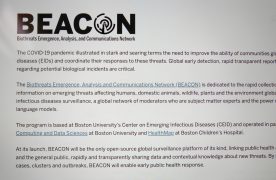After the recent events of both Sept. 11 and the ongoing corporate scandals, the Boston University journalism department has added courses in covering international terrorism as well as business and economic journalism.
Robert Zelnick, the chairman of the journalism department, said both courses were created so the University could offer students a more complete and up-to-date curriculum.
Zelnick, a former Pentagon correspondent for ABC News, teaches the terrorism course, in which students learn several aspects of covering terrorism-related events like Sept. 11th and the Iran hostage crisis.
College of Communication Dean Brent Baker said the terrorism course was added as a response to students’ desire to learn more about terrorism in a time when it is becoming a prevalent issue in American culture.
“Basically we tried to update our curriculum to give our students the best insight into the subjects they will be covering in the future,” Baker said. “As we remember Sept. 11 this week, it is also obvious that terrorism is a long-term story which journalists will be covering.”
The idea for the new course arose after an interview Zelnick did with two broadcast journalism students last spring. According to Zelnick, the two students asked him if the journalism department was adjusting the curriculum after Sept. 11, to which he told them there were no immediate plans to add such a course.
However, Zelnick later decided a class covering international terrorism would be important for a timely curriculum and added it. Zelnick said he made the decision to teach the class himself, due to the importance of the subject material.
One of the only problems with the new class appears to be its popularity, Zelnick said. The class has close to 30 students registered, although most COM non-lecture courses have less than 20 students.
The other new class, focusing on writing for business and economic journalism, has recently become popular due to scandals of major corporations, according to Baker.
“It should be obvious from the Enron scandal that the business and economic area is becoming more important to cover,” Baker said. “We feel it is important to give student journalists insight into these important areas.”
The course, taught by COM professor Andrew Leckey, teaches students about the Enron scandal and the stock market.
Leckey said he felt business journalism is “one of the areas with the greatest job opportunities in journalism today.
“I would like to help to develop business journalists who will uncover the next Enron rather than simply deal with the story after it takes place,” Leckey said.
“The presence of a great number of business and economic stories convinced us to move forward [with bringing the course back],” Zelnick said.
“[It is] vitally important to have journalists trained in the subject areas [when] going out in the business world,” he continued.
Leckey said he planned to show parts of the movie “Boiler Room” and would use CNBC and The Wall Street Journal to teach his course.
According to Zelnick, business journalism-related courses would most likely be offered at least one semester a year. He said business reporting was a field that more students were interested in entering.
“[It is an] area where we see real growth and the ability to expand,” Zelnick said. “Business and economic reporting has potential to develop into a sub-major for some students.”
Students, such as Lindsay Rundell, a COM sophomore, said they found the new classes interesting and they would consider taking them.
“I think it’s great that the University is keeping up with current trends,” Rundell said. “Even though I’m not a journalism student, I’d be interested in [the classes] because they seem to relate well to changes in the job market and recent events. I’m sure they’ll be great for preparing journalism students.”
Mordy Yankovich, a COM sophomore, said she thought it would be worthwhile since it would include tips on how to cover terrorist activities.
“As a journalist, during times of crisis, the way you relay the story or message to the public is extremely important,” Yankovich said. “The details that you decide to add or delete can tend to be controversial and can make or break your story.”
This is an account occasionally used by the Daily Free Press editors to post archived posts from previous iterations of the site or otherwise for special circumstance publications. See authorship info on the byline at the top of the page.












